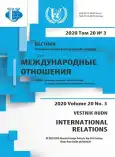Vladimir Putin, Twenty Years On: Russia’s Foreign Policy
- Authors: Freire M.R.1
-
Affiliations:
- University of Coimbra
- Issue: Vol 20, No 3 (2020): Russia’s Foreign Policy in the 21st Century: Views from Inside and Outside
- Pages: 449-462
- Section: THEMATIC DOSSIER
- URL: https://journal-vniispk.ru/2313-0660/article/view/320231
- DOI: https://doi.org/10.22363/2313-0660-2020-20-3-449-462
- ID: 320231
Cite item
Full Text
Abstract
This article touches upon the main dynamics in Russian foreign policy since Vladimir Putin came to power in 2000. Following a Constructivist approach to the analysis of foreign policy, the article positions this study at the intersection of domestic processes and external relations, as well as understanding foreign policy as a combination of material and ideational aspects. The discursive practices that drive foreign policy shaping and making are the result of social interaction, and thus, of the combination of these elements, in different formats and weights. Three main dimensions in Russia’s foreign policy course are identified, namely a normative one, defining the guiding principles for foreign policy shaping, the status dimension as the power-alignment underlining foreign policy making, and an identity-driven dimension, ontologically characterizing foreign policy. These three dimensions of analysis are co-constitutive and reinforce each other at different moments and in distinct configurations. The article concludes that Russian foreign policy in the last twenty years has kept its main end-goal quite stable - great power status, - what has changed have been the means - and ways of doing - to achieve this, both regarding a more assertive foreign policy, and increased pressure for revising the international order, attributing Russia the label of a revisionist power in the international system.
Keywords
About the authors
Maria Raquel Freire
University of Coimbra
Author for correspondence.
Email: rfreire@fe.uc.pt
PhD in International Relations, Researcher, Centre for Social Studies, Professor of International Relations, the Faculty of Economics
Coimbra, PortugalReferences
- Allison, R. (2014). Russian “Deniable” Intervention in Ukraine: How and Why Russia Broke the Rules. International Affairs, 90 (6), 1255-1297. doi: 10.1111/1468-2346.12170
- Breuning, M. (2007). Foreign Policy Analysis: A Comparative Introduction. Basingstoke: Palgrave Macmillan. doi: 10.1057/9780230609242
- Freire, M.R. & Heller, R. (2018). Russia’s Power Politics in Ukraine and Syria: Status-seeking between Identity, Opportunity and Costs. Europe-Asia Studies, 70 (8), 1185-1212. doi: 10.1080/09668136.2018.1521914
- Freire, M.R. (2017). Política externa russa no ‘interméstico’. Uma abordagem construtivista. Relações Internacionais, 55, 35-49. doi: 10.23906/ri2017.55a03
- Freire, M.R. (2018). The Quest for Status: How the Interplay of Power, Ideas, and Regime Security Shapes Russia’s Policy in the Post-Soviet Space. International Politics, 56, 795-809. doi: 10.1057/s41311-018-0164-y
- Gerrits, A. (2020). Russia in the Changing Global Order. Multipolarity, Multilateralism and Sovereignty. In: Hosli, M.O. & Selleslaghs, J. (Eds.). The Changing Global Order. Challenges and Prospects. Cham: Springer. P. 85-107. doi: 10.1007/978-3-030-21603-0
- Goble, P. (2016). Russian National Identity and the Ukrainian Crisis. Communist and Post-Communist Studies, 49 (1), 37-43. doi: 10.1016/j.postcomstud.2015.12.006
- Hill, C. (2003). The Changing Politics of Foreign Policy. Basingstoke: Palgrave Macmillan.
- Houghton, D.P. (2007). Reinvigorating the Study of Foreign Policy Decision Making: Toward a Constructivist Approach. Foreign Policy Analysis, 3 (1), 24-45. doi: 10.1111/j.1743-8594.2007.00040.x
- Kirton, J. & Larionova, M. (Eds.). (2018). BRICS and Global Governance. London: Routledge. doi: 10.4324/9781315569925
- Kowert, P.A. (2010). Foreign Policy and the Social Construction of State Identity. In: Denemark, R.A. & Marlin-Bennett, R. (Eds.). The International Studies Encyclopedia. Hobokon, NJ: Wiley-Blackwell. doi: 10.1093/acref/9780191842665.001.0001
- Light, M. (2003). In Search of an Identity: Russian Foreign Policy and the End of Ideology. Journal of Communist Studies and Transition Politics, 19 (3), 42-59. doi: 10.1080/13523270300660017
- Lo, B. (2002). Russian Foreign Policy in the Post-Soviet Era. Reality, Illusion and Mythmaking. Basingstoke: Palgrave Macmillan. doi: 10.1057/9781403920058
- Lukyanov, F. (2010). Russian Dilemmas in a Multipolar World. Journal of International Affairs, 63 (2), 19-32. URL: http://jia.sipa.columbia.edu/russian-dilemmas-multipolar-world/ (accessed: 12.03.2020).
- Makarychev, A. (2010). La Presidencia de Medvédev: El Perfil Cambiante de la Federación Rusa. Anuario Internacional CIDOB, 435-442.
- Manning, B. (1977). The Congress, the Executive and Intermestic Affairs: Three Proposals. Foreign Affairs, 55 (2), 306-324.
- McFaul, M. (2018). Russia as It Is. Foreign Affairs, 97 (4), 82-91.
- Neack, L. (2008). The New Foreign Policy. Power Seeking in a Globalized Era. 2nd edition. Lanham, Boulder: Rowman and Littlefield Publishers.
- Putnam, R.D. (1988). Diplomacy and Domestic Politics: The Logic of Two-Level Games. International Organization, 42 (3), 427-460. doi: 10.1017/S0020818300027697
- Rangsimaporn, P. (2009). Russia as an Aspiring Great Power in East Asia. Perceptions and Policies from Yeltsin to Putin. Basingstoke: Palgrave Macmillan. doi: 10.1057/9780230244740
- Saideman, S. & Ayres, R.W. (2007). Pie Crust Promises and the Sources of Foreign Policy: The Limited Impact of Accession and the Priority of Domestic Constituencies. Foreign Policy Analysis, 3 (3), 189-210. doi: 10.1111/j.1743-8594.2007.00047.x
- Sakwa, R. (2012). Modernisation, Neo-modernisation, and Comparative Democratisation in Russia. East European Politics, 28 (1), 43-57. doi: 10.1080/13523279.2011.636034
- Sergunin, A. (2020). Russia’s Strategies towards BRICS: Theory and Practice. In: Parlar, D.E. & Erşen, E. (Eds.). Russia in the Changing International System. Cham: Palgrave Macmillan. P. 133-152. doi: 10.1007/978-3-030-21832-4
- Sjöstedt, R. (2007). The Discursive Origins of a Doctrine: Norms, Identity, and Securitization under Harry S. Truman and George W. Bush. Foreign Policy Analysis, 3 (3), 233-254. doi: 10.1111/j.1743-8594. 2007.00049.x
- Suslov, M. (2017). The Production of “Novorossiya”: A Territorial Brand in Public Debates. Europe-Asia Studies, 69 (2), 202-221. doi: 10.1080/09668136.2017.1285009
- Tsygankov, A. (2014). The Frustrating Partnership: Honor, Status, and Emotions in Russia’s Discourses of the West. Communist and Post-Communist Studies, 47 (3-4), 345-354. doi: 10.1016/j.postcomstud. 2014.09.004
- Yefremenko, D.V. (2014). Crossing Red Lines. Russia in Global Affairs, 3. URL: https://eng.globalaffairs.ru/articles/crossing-red-lines (accessed: 12.03.2020).
- Zevelev, I. (2014). Russia’s National Identity Transformation and New Foreign Policy Doctrine. Russia in Global Affairs, 2. URL: https://eng.globalaffairs.ru/articles/the-russian-world-boundaries/ (accessed: 12.03.2020).
Supplementary files









